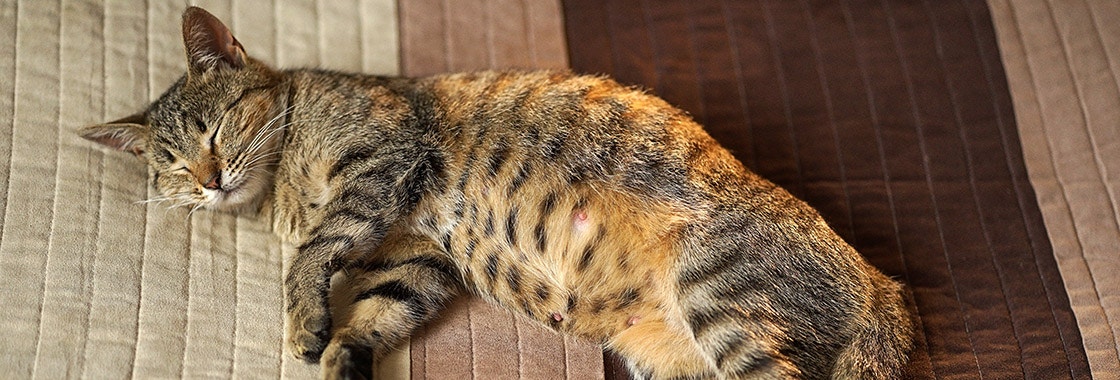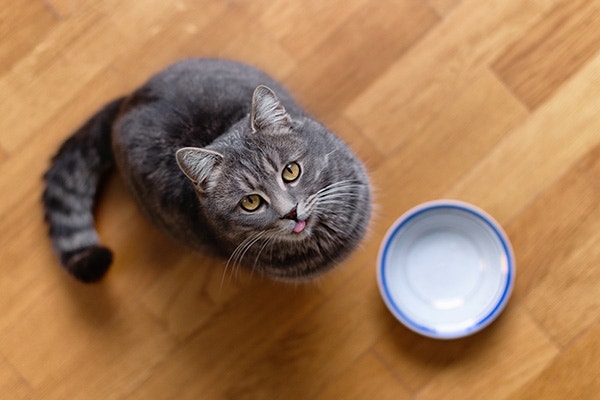How To Tell If A Cat Is Pregnant


Share
Bringing a cat into your home is full of surprises, sometimes including the pitter-patter of tiny paws. If you suspect your cat may be pregnant, it’s natural to feel unsure about what to do next. However, recognising signs your cat is pregnant early can ensure you provide the proper care throughout her pregnancy.
This guide will explain how to tell if a cat is pregnant, what symptoms to look out for, and how to support your cat through this exciting journey. Although these moments might feel uncertain, with the proper knowledge and preparation, you can ensure your cat feels safe, comfortable, and well cared for every step of the way.
Can My Cat Be Pregnant?
If you're unclear on how to tell if a cat is pregnant, it’s first essential to understand the conditions that can lead to pregnancy. Female cats that are not “spayed” (had an operation to remove their organs of reproduction- the uterus and ovaries) can go into “heat” (can mate) around 4-6 months old. Cats are “induced ovulators”, meaning they only release eggs when they mate, so pregnancy is highly likely after mating.
Female cats typically enter heat every two to three weeks during the mating season (between March and September). If in contact with an unneutered male during this period, the risk of pregnancy is high. A cat in season will be drawn to males during this time, especially if left unsupervised or roaming freely outdoors. If you're questioning, “Is my cat pregnant?' and notice sudden signs like increased affection, weight gain, vocalisation, or restlessness, these could indicate she is in heat. Tracking her behaviour and observing these symptoms is essential if you're concerned and wish to discuss it with your vet.
Signs of Pregnancy in Cats
Have you noticed your cat acting differently—more demanding or looking rounder in the middle? If so, it’s common to ask, 'how can I tell if my cat is pregnant or if something else is going on?'. Pregnant cats typically show early behavioural changes, making it easier to tell if they are pregnant.
She may become more clingy, seek attention more frequently, or display signs of irritability, especially later on. As cat pregnancy progresses, you'll notice physical changes, such as weight gain. Her teats may become more prominent and turn pinkish. She may also start nesting and look for quieter spots to prepare for kittens.
Like in humans, appetite changes and morning sickness, such as nausea and reduced appetite, are also common in these early stages. A cat’s gestation period lasts 63-65 days (around 9 weeks), making the 4-5 week mark the halfway point of her pregnancy.
Around the four-to-five-week mark, signs that your cat is pregnant become clearer. Her belly will grow, and she may gain weight more quickly. If you're asking, 'Is my cat pregnant?' ensure you try to detect signs early and confirm this with your vet to ensure she receives appropriate care and prioritises the well-being of her kittens.
Signs your cat is pregnant:
- Increased appetite
- Teats become slightly swollen and more pink/red
- Weight gain
- Morning sickness
- Nesting behaviours
- Increased affection.
Want to ensure your pregnant cat gets the proper nutrition? Learn how much to feed a cat during pregnancy to keep her healthy and strong.
How Vets Diagnose Pregnancy in Cats
If you notice signs that your cat is pregnant, such as weight gain or mood changes, it’s time to confirm this with your vet.
Here’s how vets typically diagnose pregnancy:
- Palpation – Around three to four weeks in, a vet may gently feel for developing kittens.
- Ultrasound – As early as two weeks, an ultrasound can confirm pregnancy and detect fetal heartbeats.
- X-rays – An X-ray helps determine the number of kittens after six weeks.
But don’t jump to conclusions—weight gain and mood swings could mean anything from overindulgence to an underlying medical condition. Generally, a cat's behaviour can be unpredictable, but if you’ve noticed more obvious physical signs that your cat is pregnant, a vet visit will give you a clear answer. During this time, you may also observe changes in her breathing. If you're concerned, learn more about panting in cats and when to seek help.
Cat Pregnancy Stages: From Conception to Birth
A pregnant cat doesn’t waste time—she’s on a fast-track journey from conception to cuddles in just 63-67 days. Here’s what to expect for cat pregnancy stages:
- First trimester (Weeks 1-3): Tiny embryos settle in. Your cat might experience mild nausea, a loss of appetite, and a bit of moodiness—think of it as her early nesting phase.
- Second trimester (Weeks 4-6): Now things get apparent. Her abdomen starts to round, her teats turn a soft pink, and her appetite will increase. This period is when her nesting instincts kick in—expect her to seek quiet, comfortable spaces.
- Third trimester (Weeks 7-9): The final stretch! You may see tiny kitten kicks, and she might become restless, fussing over her nest. As labour approaches, expect more grooming, panting, and even contractions. It’s nearly time for her to welcome her new family. Keep your pregnant cat indoors during the final days of pregnancy to ensure she gives birth in a safe, warm environment. Set up a quiet nesting area with a cardboard box lined with soft blankets. Encourage her to use it by placing treats nearby.
So, if you notice signs that your cat is pregnant, remember to observe these key stages. Your cat’s pregnancy journey will happen quickly, and observing it will allow you to appreciate each stage as it unfolds.
How To Tell How Far Along Your Cat Is
If you’re wondering, “Is my cat pregnant, and how far along is she?” tracking her progress can help you provide the proper care. A cat’s pregnancy lasts about nine weeks, and each stage has distinct changes.
- Week 1-3: Hormonal shifts may cause mild nausea, slight weight gain, and increased affection.
- Week 4-6: The belly becomes more noticeable, and you may notice her teats darken and become more swollen. A vet can confirm pregnancy via ultrasound.
- Week 7-9: Nesting behaviour begins, and movement from kittens may be visible. X-rays at this stage can estimate litter size.
For an accurate timeline, consult a vet who can assess your cat’s pregnancy stages with palpation or scans.
Essential Care Tips for a Pregnant Cat
Caring for a pregnant cat involves attention to her diet, environment, and handling. Provide a high-quality, well-balanced diet formulated for pregnancy, ensuring she gets the nutrients needed for her and her kittens’ growth. As her pregnancy progresses, increase her food intake to accommodate her growing needs, offering smaller, more frequent meals.
Create a quiet, comfortable space for her to rest undisturbed. Keep her environment calm and stress-free, as this will help her relax. Be gentle when handling her; allow her to approach you for affection rather than forcing interaction. Avoid handling her abdomen too much, as it may cause discomfort or stress. Regular vet check-ups are essential to monitor her health and ensure her pregnancy progresses well.
For more tips on supporting your cat’s emotional needs, see our article on becoming more affectionate.
Planning for the Arrival of Newborn Kittens
Preparing for kitten birth requires a safe and calm environment. Set up a quiet, clean space where your pregnant cat can comfortably give birth. A large cardboard box with soft towels or blankets works well without household noise or stressors.
Have essential supplies ready, such as clean towels to help dry the kittens, a heating pad set on low to keep them warm, and sterile scissors to cut the umbilical cord if needed. Also, keep your vet's contact details handy in case of complications.
During the birth process, your cat will experience contractions and may show signs of restlessness. It’s important to stay calm and let your cat do most of the work, as they usually give birth naturally.
If you notice anything unusual or feel uncertain, don't hesitate to contact your vet—they’re there to help guide you through this exciting time. Recognising cat pregnancy signs early on will help you feel more prepared and confident for the birth process.
Understanding Complications in Cat Pregnancy
While most pregnant cats have a smooth pregnancy, complications can occasionally arise. Watch for warning signs, such as prolonged labour, where your cat has muscular contractions for over an hour without delivering a kitten. If your cat discharges green or foul-smelling fluids, this could indicate an infection requiring immediate attention.
Another red flag is if your cat appears unusually lethargic, refuses food, or shows signs of distress. If you notice any of these symptoms or have concerns, it’s essential to consult a vet as soon as possible. Timely intervention can help ensure the mother's and her kittens' safety. Always remember that veterinary consultation is key if you suspect complications during cat pregnancy. Your vet can provide the necessary care and advice to guide you.
Pregnant Cats: FAQ
How can I check if my cat is pregnant at home?
If you’re wondering how to tell if a cat is pregnant, consider the early signs to look out for. Changes like weight gain, pinkened teats ('pinking up'), and increased appetite may suggest pregnancy. You may notice weight gain, behavioural changes like increased affection or resting, and appetite. To check at home, gently palpate your cat’s abdomen, feeling for small, firm lumps around 3-4 weeks into pregnancy. Her teats may also become pinker or enlarged. While these are apparent pregnancy signs, the best way to confirm is to take her to a vet for an ultrasound, physical exam or blood test.
What does a pregnant cat's tummy feel like?
Another way to tell if a cat is pregnant is by gently feeling her abdomen. As pregnancy progresses, her tummy will feel firmer and rounder, and you may notice gradual swelling. Early on, a pregnant cat's tummy will feel soft but begin to harden around the third week. As the kittens develop, the abdomen will expand, and you may even feel the individual kittens moving inside later in the pregnancy. Her abdomen will appear noticeably rounder by the final stages, and the skin may stretch slightly to accommodate the growing kittens.
How do cats act when they get pregnant?
When cats get pregnant, their behaviour often changes. They may become more affectionate, seeking attention and cuddling with their owners, or more reclusive, looking for quiet, secluded spaces to rest. Pregnant cats may eat more, while others slow down and rest more often. Every cat is different, but these signs can be strong indicators. Behavioural changes are likely to happen as your cat prepares for motherhood. If you've noticed changes but are still asking, “Is my cat pregnant?” it's worth keeping a close eye on her and speaking to a vet for reassurance.
How many months are cats pregnant for?
A pregnant cat typically carries her kittens for about nine weeks or roughly 63 days. This period is categorised by several cat pregnancy stages: early development, fetal growth, and the final weeks leading up to birth. Each stage follows typical changes in the cat's body, including weight gain and behavioural shifts. Proper care and monitoring throughout these stages are essential to ensure the mother's and her kittens' health.











